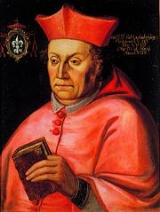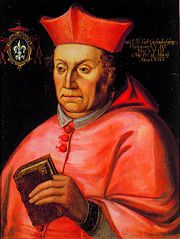
John Gropper
Encyclopedia

Soest, Germany
Soest is a town in North Rhine-Westphalia, Germany. It is the capital of the Soest district. After Lippstadt, a neighbouring town, Soest is the second biggest town in its district.-Geography:...
– 13 March 1559, Rome
Rome
Rome is the capital of Italy and the country's largest and most populated city and comune, with over 2.7 million residents in . The city is located in the central-western portion of the Italian Peninsula, on the Tiber River within the Lazio region of Italy.Rome's history spans two and a half...
) was a Roman Catholic church politician of the Reformation
Protestant Reformation
The Protestant Reformation was a 16th-century split within Western Christianity initiated by Martin Luther, John Calvin and other early Protestants. The efforts of the self-described "reformers", who objected to the doctrines, rituals and ecclesiastical structure of the Roman Catholic Church, led...
period.
Early life: follower of Erasmus
After being made keeper of the seal of the archbishopric of Cologne, he was appointed scholasticus of St. Gerson in 1527. Gropper was an adherent of Erasmus, and aided the reform efforts of Hermann von Wied, archbishop of Cologne. This led him, after having completed his legal studies at CologneCologne
Cologne is Germany's fourth-largest city , and is the largest city both in the Germany Federal State of North Rhine-Westphalia and within the Rhine-Ruhr Metropolitan Area, one of the major European metropolitan areas with more than ten million inhabitants.Cologne is located on both sides of the...
in 1525, to devote himself to theological study. He edited the Landrecht of Cologne, and also the canons of the provincial council at Cologne held in 1536 (both published in 1538, together with a detailed manual of Christian doctrine which he had composed).
In both of these Gropper's Erasmian tendency showed itself; in both he took pains to make the Bible
Bible
The Bible refers to any one of the collections of the primary religious texts of Judaism and Christianity. There is no common version of the Bible, as the individual books , their contents and their order vary among denominations...
and the Church Fathers
Church Fathers
The Church Fathers, Early Church Fathers, Christian Fathers, or Fathers of the Church were early and influential theologians, eminent Christian teachers and great bishops. Their scholarly works were used as a precedent for centuries to come...
his point of departure. In many matters, especially in the doctrine of justification, he approximated Protestant views, but he did not approve of the doctrine of the Reformers concerning the concept and the organization of the Church. He championed the seven sacraments and the veneration of images and relics. He rejected the doctrine of the priesthood of believers, he defended the hierarchical order of the Middle Ages
Middle Ages
The Middle Ages is a periodization of European history from the 5th century to the 15th century. The Middle Ages follows the fall of the Western Roman Empire in 476 and precedes the Early Modern Era. It is the middle period of a three-period division of Western history: Classic, Medieval and Modern...
and the primacy of the pope, though on these very points his differences with the representatives of the papal system were apparent. Protestant and Jesuit writers alike censured the book.
Against the Reformation in Cologne
Gropper took a zealous part in the negotiations for church union and in the religious colloquies held in 1540 and 1541 in HagenauHaguenau
-Economy:The town has a well balanced economy. Centuries of troubled history in the buffer lands between France and Germany have bequeathed to Haguenau a rich historical and cultural heritage which supports a lively tourist trade. There is also a thriving light manufacturing sector centred on the...
, Worms
Worms, Germany
Worms is a city in Rhineland-Palatinate, Germany, on the Rhine River. At the end of 2004, it had 85,829 inhabitants.Established by the Celts, who called it Borbetomagus, Worms today remains embattled with the cities Trier and Cologne over the title of "Oldest City in Germany." Worms is the only...
, and Regensburg
Conference of Regensburg
The Colloquy of Regensburg, historically called the Colloquy of Ratisbon, was a conference held at Regensburg in 1541, during the Protestant Reformation, which marks the culmination of attempts to restore religious unity in the Holy Roman Empire by means of theological debate.-Background:Delegates...
. In the latter place he secured agreement on the formulation of the doctrine of justification; but he and his sympathizers could not reach an understanding with the Protestants about the organization of the Church. When, therefore, Archbishop Hermann, felt himself committed to a far-reaching reform of ecclesiastical affairs in his archdiocese, and invited the Straßburg
Strasbourg
Strasbourg is the capital and principal city of the Alsace region in eastern France and is the official seat of the European Parliament. Located close to the border with Germany, it is the capital of the Bas-Rhin département. The city and the region of Alsace are historically German-speaking,...
Reformer Martin Butzer
Martin Bucer
Martin Bucer was a Protestant reformer based in Strasbourg who influenced Lutheran, Calvinist, and Anglican doctrines and practices. Bucer was originally a member of the Dominican Order, but after meeting and being influenced by Martin Luther in 1518 he arranged for his monastic vows to be annulled...
for that purpose, Gropper came forward as the spokesman of the clergy of Cologne in opposition to the plans for Evangelical reform proposed by his former patron; as a representative of the cathedral chapter he sought in the Landtag of March and July, 1543, to persuade the Estates to oppose Hermann and Butzer.
As he was unsuccessful, he prepared an answer to the memorial for reformation which the archbishop laid before the latter Landtag. The answer was approved by a committee of the cathedral chapter and was published in 1554 in its name, in German and Latin. When even this document did not convert the archbishop, Gropper and the members of his party lodged complaints against him with the emperor and the pope. Gropper now negotiated eagerly with imperial counselors. He addressed to the emperor his Wahrhaftige Antwort against what he claimed were false accusations by Butzer, but the latter proved the falsehood of Gropper's allegations. In connection with this fight against the heretics, Gropper came to favor the settlement of the Jesuits in Cologne. Canisius, who was especially advanced by him, praises in the highest terms Gropper's merits in saving Romanism within the archdiocese of Cologne. When the victory was won, and in place of Hermann the previous coadjutor, Adolf von Schaumburg, had been enthroned with his assistance, Gropper received the provostahip in Bonn formerly held by a brother of Hermann. Under the new archbishop, Gropper worked by word and pen against the Protestants; he likewise acted as imperial commissioner for the carrying out of the Augsburg Interim
Augsburg Interim
The Augsburg Interim is the general term given to an imperial decree ordered on May 15, 1548, at the 1548 Diet of Augsburg, after Charles V, Holy Roman Emperor, had defeated the forces of the Schmalkaldic League in the Schmalkaldic War of 1546/47...
in his native city of Soest.
Later years
How little in accordance with his wishes, however, ecclesiastical affairs developed in the next years, he himself states in a letter of 1556, in which he sets forth the reasons why he did not wish to accept the dignity of the cardinalate which had been offered to him.A letter of the following year betrays a still gloomier mood; he begged Canisius
Canisius
Canisius may refer to:* Saint Petrus Canisius* Henricus Canisius, canonist and historian* Theodorich Canisius, a Jesuit academic; half-brother of St...
not to be suspicious of him if he held aloof from the religious colloquy soon to be held in Worms
Worms, Germany
Worms is a city in Rhineland-Palatinate, Germany, on the Rhine River. At the end of 2004, it had 85,829 inhabitants.Established by the Celts, who called it Borbetomagus, Worms today remains embattled with the cities Trier and Cologne over the title of "Oldest City in Germany." Worms is the only...
. In 1558 he saw new dangers arise for those near him, when Johann Gebhard von Mansfeld was chosen archbishop of Cologne. In order to prevent his confirmation by the pope, Gropper decided to make the journey to Rome, whither Paul IV had formerly invited him in vain. The pope received him with honor and demanded his opinion in weighty matters; nevertheless, not only did he not accomplish that which he wished in the Cologne affair, but he was denounced to the Inquisition
Inquisition
The Inquisition, Inquisitio Haereticae Pravitatis , was the "fight against heretics" by several institutions within the justice-system of the Roman Catholic Church. It started in the 12th century, with the introduction of torture in the persecution of heresy...
by the Venetian Delfino.
On March 13, 1559, he died in poverty, and was buried in the church of Maria dell' Anima. The pope, probably convinced by Gropper's defense that he was innocent, spoke before a consistory on March 15 in praise of the services of the deceased and transferred his benefices to his brother Kaspar. As a papal nuncio at Cologne
Apostolic Nuncio to Cologne
The Apostolic Nunciature to Cologne was an ecclesiastical office of the Roman Catholic Church established in 1584. The nuncios were accredited to the Achbishop-Electorates of Cologne, Mainz and Trier...
Kaspar was later the zealous servant of the Counter-reformation, which directed its efforts against the Erasmian tendency which Gropper had once represented; with the result that in 1596 Gropper's Enchiridion, "the most detailed and most important pre-Tridentine dogmatic of the Reformation period," was put upon the Index Librorum Prohibitorum
Index Librorum Prohibitorum
The Index Librorum Prohibitorum was a list of publications prohibited by the Catholic Church. A first version was promulgated by Pope Paul IV in 1559, and a revised and somewhat relaxed form was authorized at the Council of Trent...
.

